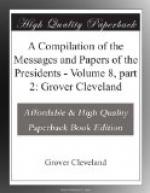The Burlingame treaty undertakes to deal with this situation, and its fifth and sixth articles embrace its most important provisions in this regard and the main stipulations in which the Chinese Government has secured an obligatory protection of its subjects within our territory. They read as follows:
ART. V. The United States of America and the Emperor of China cordially recognize the inherent and inalienable right of man to change his home and allegiance, and also the mutual advantage of the free migration and emigration of their citizens and subjects respectively from the one country to the other for purposes of curiosity, of trade, or as permanent residents. The high contracting parties therefore join in reprobating any other than an entirely voluntary emigration for these purposes. They consequently agree to pass laws making it a penal offense for a citizen of the United States or Chinese subjects to take Chinese subjects either to the United States or to any other foreign country, or for a Chinese subject or citizen of the United States to take citizens of the United States to China or to any other foreign country, without their free and voluntary consent, respectively.
ART. VI. Citizens of the United States visiting or residing in China shall enjoy the same privileges, immunities, or exemptions in respect to travel or residence as may there be enjoyed by the citizens or subjects of the most favored nation, and, reciprocally, Chinese subjects visiting or residing in the United States shall enjoy the same privileges, immunities, and exemptions in respect to travel or residence as may there be enjoyed by the citizens or subjects of the most favored nation. But nothing herein contained shall be held to confer naturalization upon citizens of the United States in China, nor upon the subjects of China in the United States.
An examination of these two articles in the light of the experience then influential in suggesting their “necessity” will show that the fifth article was framed in hostility to what seemed the principal mischief to be guarded against, to wit, the introduction of Chinese laborers by methods which should have the character of a forced and servile importation, and not of a voluntary emigration of freemen seeking our




